
A Christmas carol is a carol on the theme of Christmas, traditionally sung at Christmas itself or during the surrounding Christmas holiday season. The term noel has sometimes been used, especially for carols of French origin. Christmas carols may be regarded as a subset of the broader category of Christmas music.
A carol is a festive song, generally religious but not necessarily connected with Christian church worship, and sometimes accompanied by a dance. A caroller is someone who sings carols, and is said to be carolling.

The nativity or birth of JesusChrist is documented in the biblical gospels of Luke and Matthew. The two accounts agree that Jesus was born in Bethlehem, in Roman-controlled Judea, that his mother, Mary, was engaged to a man named Joseph, who was descended from King David and was not his biological father, and that his birth was caused by divine intervention. Some scholars do not see the two canonical gospel nativity stories as historically factual since they present clashing accounts and irreconcilable genealogies. The secular history of the time does not synchronize with the narratives of the birth and early childhood of Jesus in the two gospels. Some view the question of historicity as secondary, given that gospels were primarily written as theological documents rather than chronological timelines.

"Greensleeves" is a traditional English folk song. A broadside ballad by the name "A Newe Northen Dittye of ye Ladye Greene Sleves" was registered by Richard Jones at the London Stationers' Company in September 1580, and the tune is found in several late 16th-century and early 17th-century sources, such as Ballet's MS Lute Book and Het Luitboek van Thysius, as well as various manuscripts preserved in the Seeley Historical Library in the University of Cambridge.
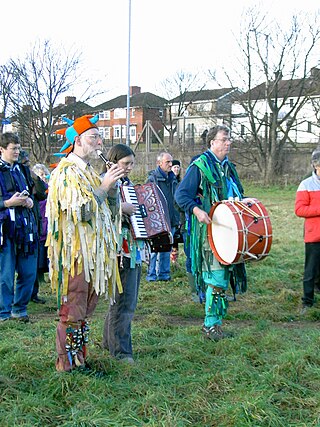
The tradition of wassailing falls into two distinct categories: the house-visiting wassail and the orchard-visiting wassail. The house-visiting wassail is the practice of people going door-to-door, singing and offering a drink from the wassail bowl in exchange for gifts; this practice still exists, but has largely been displaced by carol singing. The orchard-visiting wassail refers to the ancient custom of visiting orchards in cider-producing regions of England, reciting incantations and singing to the trees to promote a good harvest for the coming year. Notable traditional wassailing songs include "Here We Come a-Wassailing", "Gloucestershire Wassail", and "Gower Wassail".
"The First Nowell", modernised as "The First Noel" ", is a traditional English Christmas carol with Cornish origins most likely from the early modern period, although possibly earlier. It is listed as number 682 in the Roud Folk Song Index.
"We Wish You a Merry Christmas" is an English Christmas carol, listed as numbers 230 and 9681 in the Roud Folk Song Index. The famous version of the carol is from the English West Country.
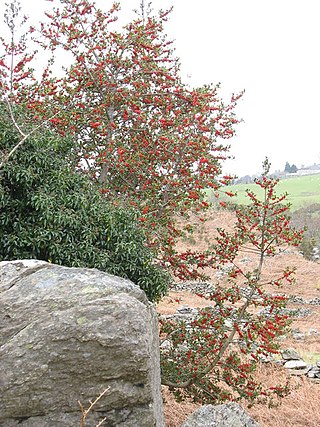
"The Holly and the Ivy" is a traditional British folk Christmas carol, listed as number 514 in the Roud Folk Song Index. The song can be traced only as far as the early nineteenth century, but the lyrics reflect an association between holly and Christmas dating at least as far as medieval times. The lyrics and melody varied significantly in traditional communities, but the song has since become standardised. The version which is now popular was collected in 1909 by the English folk song collector Cecil Sharp in the market town of Chipping Campden in Gloucestershire, England, from a woman named Mary Clayton.
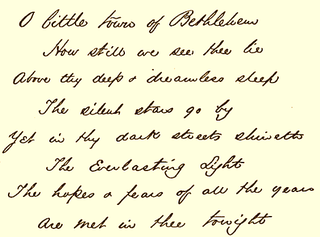
"O Little Town of Bethlehem" is a Christmas carol. Based on an 1868 text written by Phillips Brooks, the carol is popular on both sides of the Atlantic, but to different tunes: in the United States, to "St. Louis" by Brooks' collaborator, Lewis Redner; and in the United Kingdom, Canada, and Ireland to "Forest Green", a tune collected by Ralph Vaughan Williams and first published in the 1906 English Hymnal.
The "Sussex Carol" is a Christmas carol popular in Britain, sometimes referred to by its first line "On Christmas night all Christians sing". Its words were first published by Luke Wadding, a late 17th-century poet and bishop of the Catholic Church in Ireland, in a work called Small Garland of Pious and Godly Songs (1684). It is unclear whether Wadding wrote the song or was recording an earlier composition.
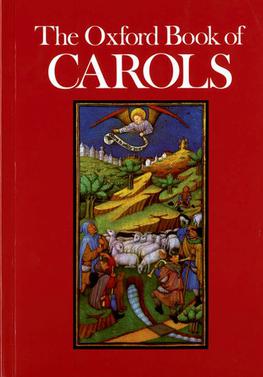
The Oxford Book of Carols is a collection of vocal scores of Christmas carols and carols of other seasons. It was first published in 1928 by Oxford University Press and was edited by Percy Dearmer, Martin Shaw and Ralph Vaughan Williams. It became a widely used source of carols among choirs and church congregations in Britain.

The "Boar's Head Carol" is a macaronic 15th century English Christmas carol that describes serving a boar's head at a Yuletide feast. Of the several extant versions of the carol, the one most usually performed today is based on a version published in 1521 in Wynkyn de Worde's Christmasse Carolles. A modern choral arrangement by Elizabeth Poston (1960) is also widely performed.
Here We Come A-wassailing, also known as Here We Come A-Christmasing,Wassail Song and by many other names, is a traditional English Christmas carol and New Year song, typically sung whilst wassailing, or singing carols, wishing good health and exchanging gifts door to door. It is listed as number 209 in the Roud Folk Song Index. Gower Wassail and Gloucestershire Wassail are similar wassailing songs.
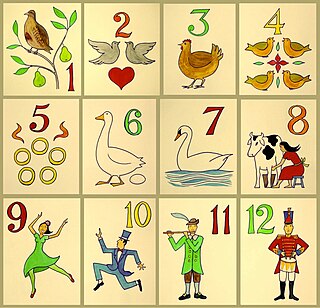
"The Twelve Days of Christmas" is an English Christmas carol. A classic example of a cumulative song, the lyrics detail a series of increasingly numerous gifts given to the speaker by their "true love" on each of the twelve days of Christmas. The carol, whose words were first published in England in the late eighteenth century, has a Roud Folk Song Index number of 68. A large number of different melodies have been associated with the song, of which the best known is derived from a 1909 arrangement of a traditional folk melody by English composer Frederic Austin.
"As with Gladness Men of Old" is an Epiphany hymn, written by William Chatterton Dix on 6 January 1859 (Epiphany) while he was ill in bed. Though considered by many as a Christmas carol, it is found in the Epiphany section of many hymnals and still used by many churches. The music was adapted by William Henry Monk in 1861 from a tune written by Conrad Kocher in 1838. The hymn is based on the visit of the Biblical magi in the Nativity of Jesus.

"The Three Kings", or "Three Kings From Persian Lands Afar", is a Christmas carol by the German composer Peter Cornelius. He set "Die Könige" for a vocal soloist, accompanied by Philip Nicolai's hymn "Wie schön leuchtet der Morgenstern", which he erroneously thought was an Epiphany hymn. In fact, it is an Advent hymn in which the morning star is an allegory for the arrival of Jesus, not the Star of Bethlehem. In Cornelius' original second setting, the accompaniment was played on a piano but the English organist Ivor Atkins later arranged the accompaniment for choir, with the choir singing the words of the original hymn. The German words have been translated into English by H.N. Bate. The carol describes the visit of the Biblical Magi to the Infant Jesus during the Nativity and is also used as an Epiphany anthem.
The Lord at first did Adam make, alternatively The Lord at first had Adam made is a traditional English Christmas carol which was collected and first published in 1822 in Davies Gilbert's collection Some Ancient Christmas Carols...Formerly Sung in the West of England. The carol relates the events of Genesis, Chapter 3, relating the evils that have befallen humanity since that first fall and humanity's subsequent redemption; during Advent, a traditional theme is of the birth of Jesus being the coming of the "Second Adam".
"Sir Christèmas" is a traditional British Christmas carol. The song's lyrics and melody are by an unknown author, with the first record of the song in the Ritson Manuscript, dating the song to some point before 1510.
"The Rocking Carol", also known as "Little Jesus, Sweetly Sleep" and "Rocking", is an English Christmas carol by Percy Dearmer. It was translated from Czech in 1928 and is performed as a lullaby to the baby Jesus. The carol has also been known in English as the "Rocking" carol since an American edition in 1963. The carol has been recorded by Julie Andrews, Roger Whittaker and other artists.
The Gloucestershire Wassail, also known as "Wassail! Wassail! All Over the Town", "The Wassailing Bowl" and "Wassail Song" is an English Christmas carol from the county of Gloucestershire in England, dating back to at least the 18th century, but may be older.










